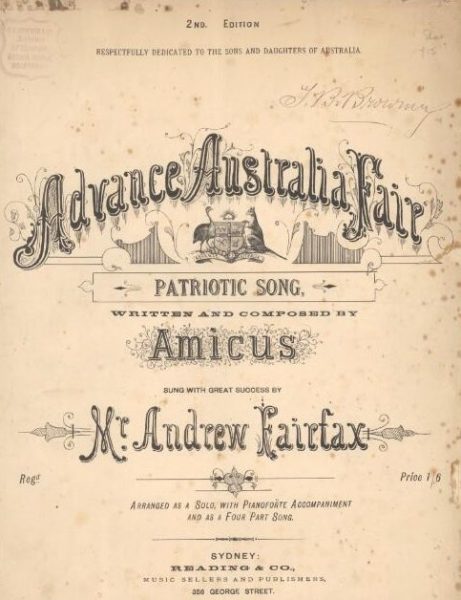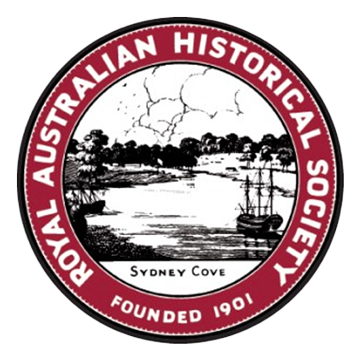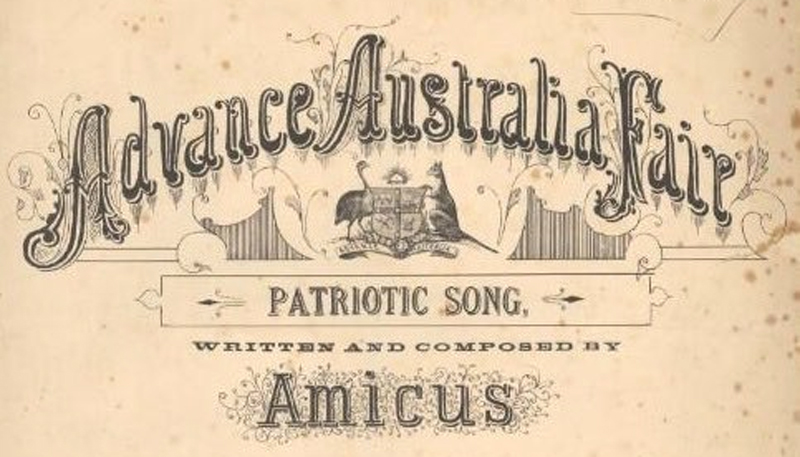Written by RAHS volunteer, Elizabeth Heffernan
In 1878, Scottish-born Australian composer Peter Dodds McCormick wrote the music and lyrics to a new patriotic song, ‘Advance Australia Fair’. One hundred and six years later, on 19 April 1984, his song – amended to suit a more modern audience – was adopted as the new Australian national anthem, replacing ‘God Save the Queen’.
Today, ‘Advance Australia Fair’ is unquestionably played at local, national, and international political, cultural, and sporting events. Its lyrics are both uplifting and confusing, with children and adults alike still wondering what “girt by sea” really means. (1) The popularity and prevalence of ‘Advance Australia Fair’ makes its complex and contentious history all the more astonishing. Indeed, many younger Australians may not be aware of it at all.

Peter Dodds McCormick 1879, Advance Australia Fair : patriotic song, Reading & Co, Sydney [Image courtesy National Library of Australia]
A competition for a new anthem was held by the Australia Council for the Arts and received more than 1400 entries for lyrics and 1200 entries for music. (3) The judges, however, felt that the submissions did not meet the standards set by such Australian classics as ‘Waltzing Matilda’, Caroline Carleton’s ‘Song for Australia’, and McCormick’s ‘Advance Australia Fair’, which had enjoyed popularity as the ABC news bulletin fanfare until 1952. (4) The Council therefore recommended that the new anthem be selected from those three songs.
A plebiscite was conducted in 1974 asking Australia to decide. Controversially, the Whitlam government chose not to include ‘God Save the Queen’ as an option for the vote, prompting criticisms that Labor was “taking for granted” the notion that Australians wanted a new anthem in the first place. (5) Despite these problems, ‘Advance Australia Fair’ won by an overwhelming majority of 51.4%, and was adopted later that year as the new national anthem. Opposition to this decision was widespread, particularly from those who argued that the new lyrics celebrated the same old idea of empire as ‘God Save the Queen’. In 1976, responding to this outcry, the Fraser government reinstated ‘God Save the Queen’. (6)
Another poll was conducted in 1977, this time with a fourth option of ‘God Save the Queen’. Despite Malcolm Fraser’s own preference for ‘Waltzing Matilda’, the same result was returned: the Australian people wanted ‘Advance Australia Fair’ as our new national anthem.
It was only in 1984 that a decision on the result of this second plebiscite was made by the Hawke government, pressured by the upcoming Los Angeles Olympics for which many desired an authentically Australian anthem to play in the medal ceremonies. ‘Advance Australia Fair’ was finally and officially adopted as the new national anthem with a number of significant and modernising alterations to the original text, including removing three out of the five verses and changing the opening words from “Australia’s sons” to “Australians all”. (7) Many still had issues with the song, however, notably those who pointed out its failure to acknowledge First Nations people. As eminent historian Manning Clark stated, “you could hardly call the Aborigines ‘young and free’”. (8)
These important issues are yet to be resolved today. As history has shown, that process will not be an easy one. Yet it was only thirty-five years ago that ‘Advance Australia Fair’ became our national anthem – who knows where the next thirty-five will leave us?
References:
(1) David Campbell, “Time girt went down the gurgler”, Herald Sun, 22 April 2008.
(2) James Curran and Stuart Ward, The Unknown Nation: Australia After Empire (Melbourne: Melbourne University Press, 2010), p. 164.
(3) “Australian National Anthem”, Department of the Prime Minister and Cabinet, <https://www.pmc.gov.au/government/australian-national-anthem>, accessed 18 April 2019.
(4) “Sounds of Australia – Media Resources”, National Film and Sound Archive, <https://web.archive.org/web/20071018045853/http://screensound.gov.au/services/soa-media/index.html>, accessed 18 April 2019.
(5) Curran and Ward, The Unknown Nation, p. 169.
(6) “Australian National Anthem”.
(7) Curran and Ward, The Unknown Nation, p. 189.
(8) Ibid, p. 189.
Published online: 19 April 2019


0 Comments